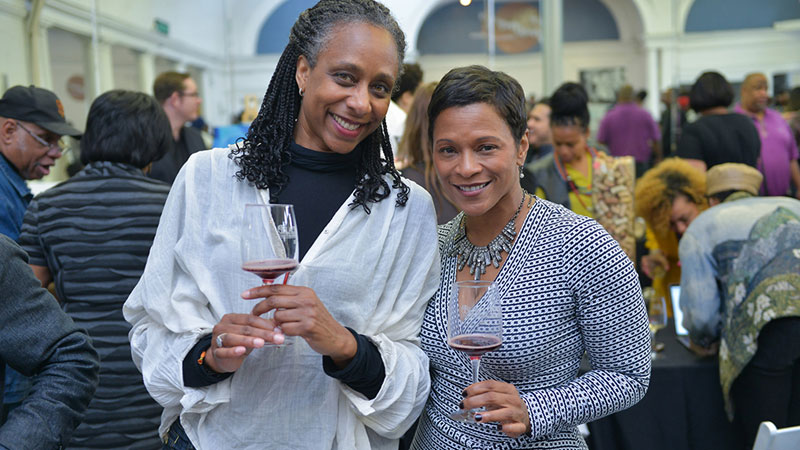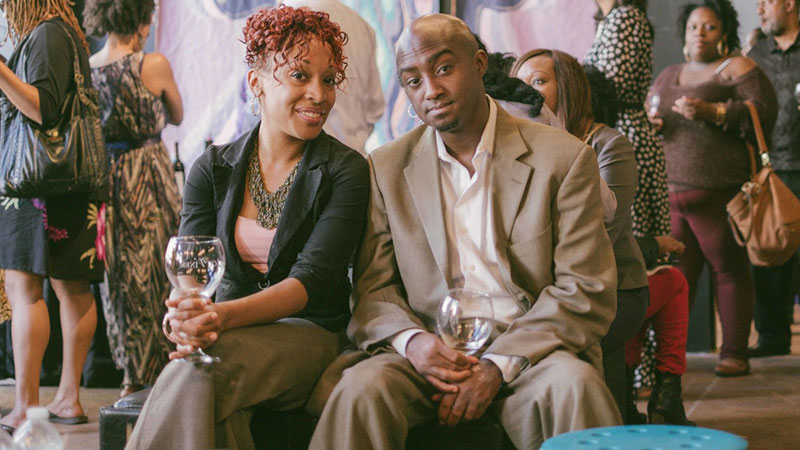Oakland’s appeal encompasses a cultural cornucopia of food, music, art, and activism. Wine lovers will feel right at home here, too, as a growing network of winemakers in Oakland and the Bay Area is establishing its own identity, apart from its well-established neighbors in Napa and Sonoma.
Along with Oakland’s Urban Wine Trail, which showcases tasting rooms in warehouses in the heart of the city, a subset of Oakland’s wine scene is flourishing in the city’s outskirts. Its sustainably sourced, award-winning wines are made for and by a historically underserved group of drinkers: black Americans.
Black Panthers to Black Vines
In 1966, the Black Panther Party formed in Oakland, Calif. Founded by Huey Newton and Bobby Seale, the political organization’s goals included fighting police brutality against black Americans and establishing independence in black communities. The Black Panther Party officially dissolved in 1982, but it remains an integral part of the city’s legacy and identity.
Since then, Oakland has changed dramatically. The historically black city is one of the most ethnically diverse in the country, but gentrification from Silicon Valley spillover is creating a contrast to the city’s proudly black origins.

“Oakland is kind of like the anti-Wakanda,” Shawn Taylor, co-founder of San Francisco’s Black Comix Arts Festival and the The Nerds of Color website, told KQED last year. In the “Black Panther” film, the Wakanda nation never faces imperial oppression and is a global technology leader. Locals say the opposite is true in Oakland. “Technology here is fueling gentrification and the displacement of Oakland’s historic black population,” Sandhya Dirks writes in KQED.
Oakland activists and community leaders are now reclaiming city spaces and celebrating their histories and futures in the city. The Black Joy Parade, which marked its second year on Feb. 24, 2019, is a “hyper-positive” community gathering of black artists, activists, and businesses. Black Vines, founded in 2010, is an organization that showcases black-owned winemakers in the Bay Area and beyond.
“It started as an idea to make the wine tasting experience more comfortable [for African-Americans],” Fern A. Stroud, founder, Black Vines, tells VinePair. It also serves as “a platform for black winemakers to showcase their wines.”
Stroud, herself a Silicon Valley executive, sees similarities between the wine and tech worlds. She hopes Black Vines can bridge “the gap between business, art, and community.”
One of Black Vines’ first participants was Mac MacDonald, founder of Vision Cellars and co-founder of the Association of African American Vintners. “My goal is to get more African-Americans enjoying wine and being knowledgeable,” McDonald told Rolling Out in 2011.

Fueling the awareness of black-made wines are venues and organizations that showcase their work. “With events such as April Richmond’s Soul of the City and Fern Stroud’s Black Vines, the Oakland community can come out and meet black winemakers from around the Bay Area and country,” V. Sheree Williams, publisher and editor-in-chief of Cuisine Noir Magazine, tells VinePair. “These events are great for introducing the brands to many for the first time.”
“The Oakland urban wine scene is great,” Erik Trinidad, a travel and food writer based in Oakland, says. He likens Oakland’s wine scene to the city as a whole: “Diverse and unpretentious.”
“In my Oakland wine-drinking experience, I’ve been to a winery where Sonoma reds are produced by Brooklyn Jewish transplants [Brooklyn West Winery], and a wine bar with Zins produced by a Californian African-American family,” Trinidad says. “At alaMar, a Michelin-recommended bistro, said Zinfandel pairs well with oysters and ‘90s hip-hop. At Campovida, the neighborhood is gritty — it’s in an industrial park — but the rosé and Pinot Noir are refined.”
Despite the growth and enthusiasm, many believe Oakland has some work to do. “None of the black winemakers have a tasting room in Oakland,” Williams says. Meanwhile, black-owned wineries such as Brown Estate in Napa, Longevity Wines in Livermore, Corner 103 in Sonoma, and J. Moss in Napa have tasting rooms in their respective cities.
Black Winemaking, Present and Future
At the eighth annual Black Vines “mini-festival” on Feb. 23, 2019, there were more than a dozen winemaker participants. Attendees included Paula Harrell of P. Harrell Wines, Theopolis Vineyards founder Theodora Lee, fondly known as “Theo-patra,” and Wachira Wines, an urban winery that offers “Urban Wine Safari” tours and tastings. There were also local artists, jazz musicians, and “culinary artists,” Stroud says. “It sold out completely.”
Its 2019 non-profit partner was BlackFemaleProject, an organization that prepares black women for “the various ‘isms’ in the workplace,” Stroud says.
Word of mouth has fueled Black Vines’ growth. “Every year I hear the same two things: One, ‘I never knew there were black winemakers.’ And two, ‘this is an amazing event, and I want to tell all my friends about it,’” Stroud says. Attendees “come in not knowing what to expect, and leave feeling whole,” she says.
Last year, Black Vines started its partnership with the Black Joy Parade. “It’s all about the ability to provide wine education,” Shroud says. And, she adds, those who skip the parade are “missing a once-in-a-lifetime experience. It’s a celebration of culture, of pride, of joy, and ultimately, of black future. It’s a wonderful end to Black History Month.”
5 Bottles From Black-Owned Oakland Wineries to Try
McBride Sisters Wine (formerly Truvée) was founded in 2010 by Andrea and Robin McBride, half-sisters who met in their 20s after learning they shared a father. Their wines are made with sustainably farmed grapes from both California and New Zealand, where each sister grew up. Look for their New Zealand Sauvignon Blanc and New Zealand Sparkling Brut Rosé; Central Coast California Chardonnay and Central Coast California Red Blend; and Black Girl Magic Riesling. The sisters plan to open a tasting room in Oakland in 2019.
P. Harrell Wines sources its grapes from Sonoma County and creates wines as “a tribute to my family’s legacy,” founder Paula Harrell writes. Current offerings include a 2018 Haight Street Dry Riesling, a Gold Medal winner in the 2019 San Francisco Chronicle International Wine Competition; 2017 Three Fifteen Dry Creek Valley Zinfandel; and the 2017 P.J. Rosé.
Lawyer-by-day Theodora “Theo-patra” Lee, Esq., wasn’t expecting to launch Theopolis Vineyards in Yorkville, Calif. The brand began when, after a rainy season, the vineyard’s grapes were no longer viable to sell to clients. So, Lee decided to make her own wine and has produced several award-winning brands ever since.
The 2013 Theopolis Vineyards Estate Grown Petite Sirah won three golds – in the 2017 Orange County Commercial Wine Competition, 2016 San Francisco International Wine Competition, and 2016 Sunset Magazine International Wine Competition.
“Wine made from flowers — not grapes” sums up the mission of this organic, sustainable, local Oakland winery. RoseHybiscus, a ruby-red wine made from rose and hibiscus flowers, is its bestseller. “But the lavender sparkling is also amazing,” Stroud says.
This award-winning winery established in 1995 specializes in Pinot Noir from Ms. Lil’s Vineyard in the Russian River Valley. According to a 2011 interview, the wines have even been served at the White House. Look for founder Mac McDonald, who also co-founded the Association of African American Vintners, at wine dinners around the city and country — next stop, Alabama.
5 of the Best Black-Owned Oakland Restaurants
This Michelin-recommended bistro where guests are encouraged to eat with their hands is “a studied blend of high and low,” East Bay Express wrote in 2014. It melds a nautical theme with classy seafood boils, along with wines made by local black vintners. Location.
The beloved soul food brunch spot helmed by Chef Tonya Holland of “Top Chef” fame recently relocated to a new location uptown. In the new, 4,000-square-foot space, Holland serves Southern-inspired staples like fried chicken and waffles, gumbo, and shrimp and grits, SFist reports. Another Brown Sugar Kitchen location is debuting at Oakland Airport. Location.
A bar and cafe in Old Oakland, Oeste offers dishes and drinks made with fresh, organic, sustainably farmed California ingredients. The women-owned establishment merges Latino and Southern recipes from the families of owners Sandra Davis, Lea Redmond, and Anna Villalobos. The beverage list includes beers from trendy San Francisco outfit Fort Point and wines from Oakland winemaker P. Harrell. It also features a rooftop bar, complete with a green wall nourished with a greywater system. Location.
Southern flavors meet fresh herbs and house-mixed spices at vegan soul food spot Souley Vegan. Go for the “zingy” smothered potatoes and tofu scramble, and stay for a local beer or a custom cocktail made with fresh lemons, limes, and berries. Location.
A favorite of Cuisine Noir’s V. Sheree Williams, this friendly Jamaican joint offers classics like jerk chicken and curried goat paired with signature cocktails, housemade ginger beer, Jamaican sorrel, and limeade. The menu also includes vegan, vegetarian, nut-free, and gluten-free options. The Fern Gully rum bar features the largest rum selection in Oakland, and its cocktail rotation has featured standouts like the Wakanda Punch made with pea flower served during Oakland Cocktail Week in September. Location.
Where to Stay
At press time, Oakland’s city center mainly has chain hotels including several Hilton and Marriott properties. In 2019, the Homage Hotel Group, a company dedicated to black travelers, will debut its Town Hotel.
“When I first had the idea [to open up a hotel], Oakland was at the top of the list,” Damon Lawrence, founder of the Homage Hotel Group, told Essence last year. “There wasn’t a brand that spoke to what Oakland is about and told the story well.” The Homage Hotel Group opened The Moor, a hotel focused on black culture, in New Orleans in 2018.
The Town will have bathrooms stocked with Shea Moisture and black soap, and “everything that caters to your unique black needs,” Essence writes. It will also include a rooftop bar and lounge, and a partnership with alaMar, which will reportedly open a new location inside the hotel.
